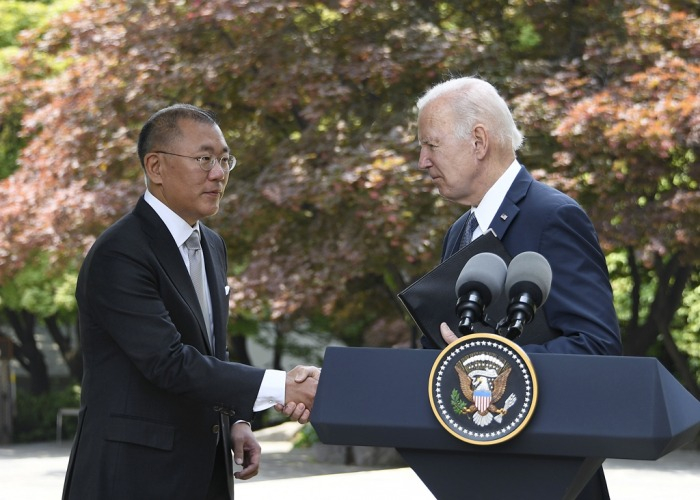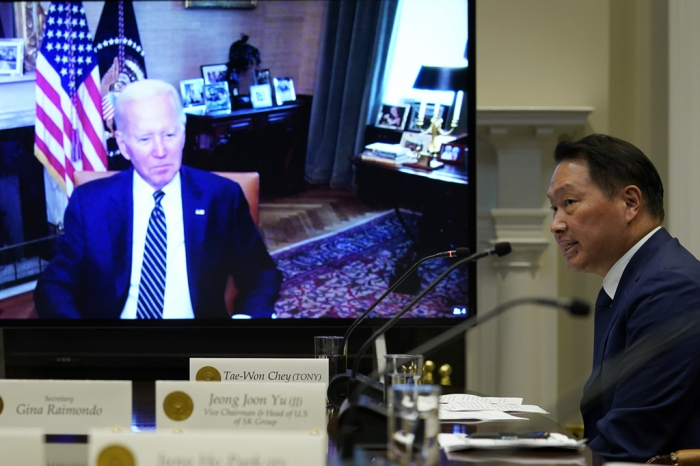Electric vehicles
Seoul says US tax credit bill risks violation of FTA, WTO
South Korea asks the US to relax tax credit eligibility for electric vehicles
By Aug 12, 2022 (Gmt+09:00)
2
Min read
Most Read
S.Korea's LS Materials set to boost earnings ahead of IPO process


NPS to commit $1.1 billion to external managers in 2024


Samsung shifts to emergency mode with 6-day work week for executives


Samsung Heavy Industries succeeds autonomous vessel navigation


Korean battery maker SK On expects business turnaround in H2



South Korea has conveyed concerns to the US about its legislative move to remove tax credits from electric vehicles produced outside of North America, which it said risks violating the free trade agreement (FTA) and World Trade Organization (WTO) rules, a senior government official said on Thursday.
The US Senate passed a $430 billion Inflation Reduction Act (IRA) on Sunday, which includes provisions to raise the bar for tax credits for EV buyers, a move aimed at countering ChinaŌĆÖs growing influence in the global economy.
Following the Senate passage of the bill, South Korean Trade Minister Ahn Duk-geun on Thursday met with the countryŌĆÖs top three EV battery manufacturers: LG Energy Solution Ltd., SK On Co. and Samsung SDI Co.
At the closed-door meeting, he said the South Korean government has expressed concerns to Washington that the proposed legislation could breach both the FTA between the two countries and the WTO rules of lowering trade barriers.
ŌĆ£We also asked the US trade administration to relax eligibility for the tax credits,ŌĆØ he said after the meeting.
Under the proposed bill, Washington will gradually eliminate tax breaks from vehicles, whose battery materials and components are sourced from China as well.
The IRA also includes provisions to combat climate change and to extend healthcare coverage. It is highly likely to pass through the US House of Representatives. The ruling Democratic Party controls half of the lower House.
Korean battery producers could benefit from the new legislation, which may prompt EV makersŌĆÖ shift away from CATL, the worldŌĆÖs largest battery producer, industry watchers said. ┬Ā
However, the bill is expected to take a heavy toll on domestic automakers, particularly cars produced at home.

To gird for the toughening US policy moves against foreign-made cars, South Korean carmakers and EV battery suppliers are expanding production facilities in the US.
In May, the Hyundai Motor Group, parent of both Hyundai Motor and Kia Corp., unveiled a $10.5 billion plan to invest in the US. The investment package includes building its first dedicated full EV plant and battery manufacturing facilities in the US state of Georgia by 2025.
SK Group is aggressive in investing in the US as well. Last month, the countryŌĆÖs No. 2 conglomerate unveiled a fresh $22 billion investment plan in the US manufacturing sector.
The group's spending plan excludes the 3 billion won earmarked for an EV battery plant to be built in the US state of Georgia to supply to the Hyundai plant there.
Additionally, SK On is building two EV battery factories in Tennessee and in Kentucky for $7 billion, jointly with Ford Motor Co.
Another SK Group unit SK Signet Inc. plans to launch an EV charger plant in the US, which would be its first overseas charger manufacturing facility. ┬Ā
Write to So-Hyeon Kim at alpha@hankyung.com
Yeonhee Kim edited this article
More to Read
-
 Electric vehiclesSK seeks to build EV charger plant in US on subsidies
Electric vehiclesSK seeks to build EV charger plant in US on subsidiesAug 11, 2022 (Gmt+09:00)
3 Min read -

-
 AutomobilesHyundai Motor raises N.America workforce, cuts China staff
AutomobilesHyundai Motor raises N.America workforce, cuts China staffJul 07, 2022 (Gmt+09:00)
1 Min read -
 Corporate investmentHyundai Motor to launch investment affiliate in US for further growth
Corporate investmentHyundai Motor to launch investment affiliate in US for further growthJul 01, 2022 (Gmt+09:00)
2 Min read -
 Electric vehiclesGeorgia state to provide $1.6 bn in incentives to Hyundai
Electric vehiclesGeorgia state to provide $1.6 bn in incentives to HyundaiMay 23, 2022 (Gmt+09:00)
3 Min read -
 Electric vehiclesHyundai to invest $10.5 bn in US EV, future mobility sectors
Electric vehiclesHyundai to invest $10.5 bn in US EV, future mobility sectorsMay 22, 2022 (Gmt+09:00)
5 Min read
Comment 0
LOG IN


